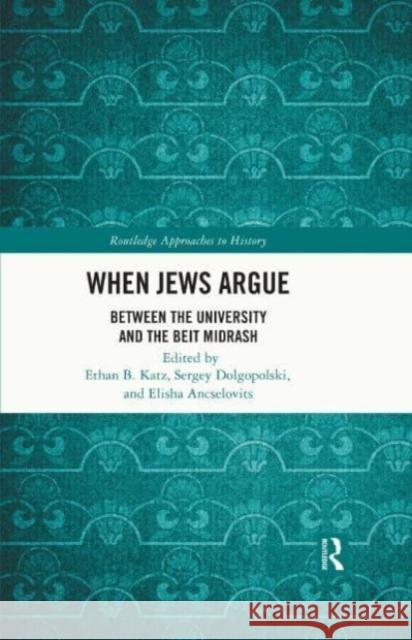When Jews Argue » książka



When Jews Argue
ISBN-13: 9781032427409 / Twarda / 2023 / 294 str.
This book re-thinks the relationship between the world of the traditional Jewish study hall (the beit midrash) and the academy.
Wydanie ilustrowane
“When Jews Argue is an ambitious and exciting volume that tackles a set of interlocking questions regarding the nature, purpose, and potential of the contemporary academe. The editors have assembled a remarkable group of essays that share a common goal: exploring the fertile contact point between traditional Jewish learning and academic scholarship, highlighting the overlaps between these approaches while demonstrating what they can, and should, learn from one another. Tapping into the resources of both the academy and the rabbinic tradition, the book seeks to chart a new path in which the mutual engagement of these realms is productive and enriching rather than divisive or isolating. The volume is sure to spark important conversations between individuals who hail from these two communities, but it also carves out room for another readership inhabiting the “third space” between the religious study-hall and the university. Anyone who approaches When Jews Argue with an open mind will come away inspired, challenged, and uplifted.”
- Ariel Mayse, Stanford University
“This important and original book introduces us to a range of rigorously considered case studies that break down simplistic dichotomies between academic scholarship and religious devotion. The authors in this volume provide essential historical context for the divide between academy and beit midrash, while also offering conceptual and pedagogical paradigms to bridge the two. This book should be required reading for all those interested in engaging in rich intellectual dialogue across academic and religious difference.”
- Jane Kanarek, author of Biblical Narrative and the Formation of Rabbinic Law
“When Jews Argue is a bold and innovative book. It raises challenging and important questions about Jewish studies for both the academic scholar and the religious Jew with scholarly curiosity. The editors and contributors address the difficult chasm between Jewish studies scholars based in the academy, and those more grounded in the traditional world of the Beit Midrash. The book features highly original essays on numerous fascinating topics, and includes several real models, in a range of areas of Jewish studies, for bringing together different fields and disciplines, and for bringing together knowledge from academic Jewish studies with knowledge from the Beit Midrash. We also learn about important issues or questions that are at the crossroads of those two worlds and that have therefore often been avoided or left unaddressed.”
- Shai Held, President and Dean, The Hadar Institute
“The contributions in this volume productively analyze and reflect on different modes of studying Jewish thought, culture, and history in our postsecular age. Rather than seeking to reconcile the gap between a reified dichotomy – critical, dispassionate scholarship versus faithful study – these essays engage and refine the scholastic terms of engagement. A refreshing and generative approach to a vexed topic!”
- Mara Benjamin, author of The Obligated Self: Maternal Subjectivity and Jewish Thought
Introduction: Engagement: Religious Devotion, Academic Relativism, and Beyond. 1. Terms: Is Jewish Studies Devotionist, Relativist, or Transcendentalist? 2. Philosophy: Moses Mendelssohn, Leo Strauss, and the Relativist/Devotionist Divide. 3. History: Devotionist Textual Scholarship and Historical Consciousness in Early Modern Responsa. 4. Law: The Mothers, the Mamzerim, and the Rabbis: A Post-Holocaust Halakhic Debate as Legal and Historical Source. 5. Language: Did the Medieval Grammarians’ Scientific Approach to Hebrew Reject or Embrace Tradition? 6. Ethics: Debating the Proper Orientation of the Ethical Self in Rabbinic and Monastic Sources from Antiquity. 7. Pain: Milk and Blood, or the Critical Place of Suffering for Sages and Readers of the Talmud. 8. Consent: Coercion, Consent, and Self in the Redaction of a Bavli Sugya. 9. Feminism: Relativism and Devotion, the Yarmulke, and the Ex-Bais Yaakov Girl. 10. Postmodernism: The Soft Radicalism of Rav ShaGaR. 11. Education: A Case Study in Devotional and Relativist Learning in Early Childhood Religious Education. Afterword: Limits: Thesis, Antithesis, Synthesis.
Ethan B. Katz teaches History and Jewish Studies at the University of California, Berkeley. His previous books include The Burdens of Brotherhood: Jews and Muslims from North Africa to France (2015) and Secularism in Question: Jews and Judaism in Modern Times (2015, co-edited with Ari Joskowicz).
Sergey Dolgopolski is Gordon and Gretchen Gross Professor of Jewish Thought in the University at Buffalo SUNY. He has written Other Others: The Political After the Talmud (2018); The Open Past: Subjectivity and Remembering in the Talmud (2012); and What is Talmud? The Art of Disagreement (2009).
Elisha Ancselovits teaches at the Pardes Institute of Jewish Studies and Yeshivat Maale Gilboa and is a fellow at Emory University’s Center for the Study of Law and Religion. He has published widely in English and Hebrew and is completing a multi-volume history of Judaism through the lens of Jewish Law.
1997-2026 DolnySlask.com Agencja Internetowa
KrainaKsiazek.PL - Księgarnia Internetowa









